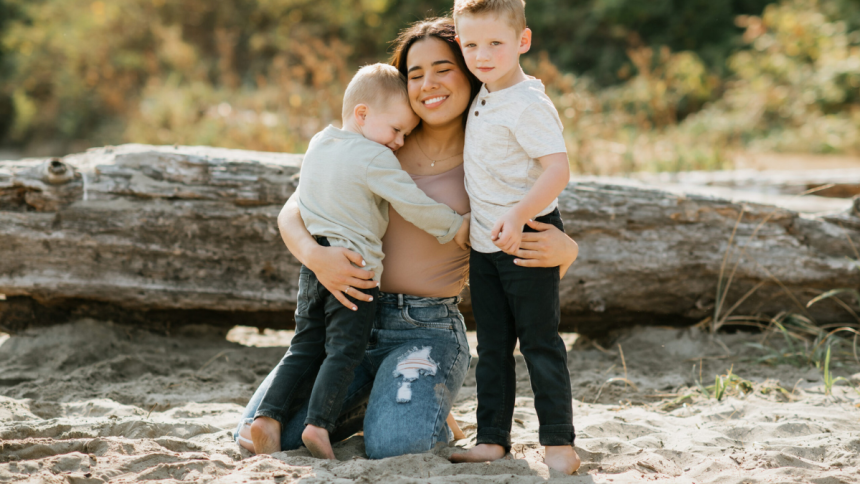What makes someone feel like family instead of just someone who works in your home? It’s not the job description. It’s not the hours or even the responsibilities. It’s the small, consistent moments that turn a working relationship into something much more personal.
When a family welcomes an au pair into their home, they’re not just hiring help. They’re opening the door to a unique kind of relationship — one built on trust, shared experiences, and daily life lived together. And when it’s done right, the connection runs deeper than any job contract.
It Starts With Mindset
The difference between being treated as a helper and being treated as family often comes down to one simple thing: intention.
Families who make an effort to integrate their au pair into their lives usually start by shifting how they see the role. Instead of viewing them as hired help or a nanny, they treat the au pair as someone who is joining the household as a temporary family member.
This can show up in small but meaningful ways. Including the au pair in family dinners. Asking for their opinion during group decisions. Celebrating their birthday, or even just asking how their day went. These moments add up.
Shared Space, Shared Life
Living under the same roof makes the relationship between an au pair and the host family different from most working arrangements. There’s a closeness that comes from sharing everyday life, not just tasks.
Over time, it’s the casual, day-to-day things that create bonds:
- Breakfast chats – Quick catch-ups over toast and coffee help everyone start the day connected.
- School pickups and drop-offs – These small routines often lead to conversations and laughs that deepen relationships.
- Lazy weekends – Watching movies together, going for walks, or simply sharing a quiet afternoon can build comfort and trust.
- Family traditions – Whether it’s Sunday pancakes or seasonal decorating, including an au pair in these routines makes them feel part of something meaningful.
When an au pair starts feeling comfortable enough to join in — or even initiate — these activities, it’s a sign they’re becoming more than just support. They’re becoming part of the rhythm of family life.
Communication That Goes Beyond Tasks
Good communication is always important, but when someone is living in your home, it matters even more. It’s not just about giving instructions or setting rules. It’s about creating space for open, two-way conversations.
Families who prioritize meaningful communication often:
- Ask questions about the au pair’s background, culture, and opinions
- Take time to explain family values and parenting styles, not just house rules
- Check in regularly, not just when something’s wrong
This type of communication shows respect. It invites the au pair to contribute to the home, not just follow directions. Over time, that mutual respect grows into mutual care.
The Role of Children
Children can be one of the biggest reasons an au pair feels part of the family. Their openness, curiosity, and affection often break down walls quickly.
Au pairs who build a real bond with the kids tend to find that the rest of the relationship follows. Kids don’t fake connection. When they run to the au pair with their stories, trust them with their feelings, or simply want to spend time together, it’s a clear sign of belonging.
And when children see the au pair as someone they care about, not just someone who “watches” them, it changes the dynamic in the whole home.
Respecting Boundaries Strengthens the Bond
It might sound counterproductive, but industry leader Go Au Pair points out that respecting personal space and boundaries is an important part of building a real connection. Treating an au pair like family doesn’t mean expecting them to be available 24/7 or constantly “on.”
Families that get this balance right usually:
- Make sure the au pair has private time and space to recharge
- Avoid expecting them to pitch in during off-hours
- Clarify the difference between time on duty and time off
This respect builds trust. And it helps the au pair feel safe and appreciated, which makes it easier for them to open up and engage more fully during shared time.
Letting Them Share Their Culture
When a family is genuinely curious about an au pair’s culture, background, and personal traditions, it shows that they care about who the person is, not just what they do.
Encouraging an au pair to cook a favorite meal from home, teach the kids a few words in their native language, or celebrate a holiday from their culture can be a big deal. It sends a clear message: “We see you, and we’re glad you’re here.”
These exchanges often lead to richer, more personal relationships. And they also help children grow up with a broader understanding of the world.
Here are some simple ways to invite cultural sharing into the home:
- Family cooking nights – Let the au pair choose a recipe from their home country.
- Storytime swaps – Share books or stories from different cultures during bedtime routines.
- Music sharing – Play songs from each other’s playlists during drives or chores.
- Holiday celebrations – Recognize at least one tradition or event from the au pair’s culture each year.
What Belonging Feels Like
When an au pair truly becomes part of the family, it doesn’t always show up in grand gestures. Most of the time, it’s in the comfortable silence. The natural way someone moves around the kitchen. The way a child reaches for their hand. Or the way they know exactly how each person takes their tea.
Belonging is quiet, but powerful. It shows in small routines, shared laughs, and honest conversations. It’s when both sides stop feeling like they’re “trying” and just start being.
That’s the difference between being an employee and being embraced as family.
It’s Not About Perfection
No family is perfect. No au pair is, either. And that’s not the point.
What makes an au pair feel like part of the family isn’t that every moment is easy or every interaction is warm. It’s that even when there are challenges, there’s still care, patience, and effort.
Mistakes will happen. There will be miscommunications, cultural differences, and moments of tension. But families who treat their au pair with kindness and inclusion during the tough moments are the ones who build real, lasting relationships.
More Than a Role, It’s a Relationship
When an au pair becomes part of the family, it changes everything. The kids get another trusted adult who truly knows them. Parents gain someone who’s invested, not just assigned. And the au pair gets a home where they’re more than just useful, they’re wanted.
It takes effort, openness, and a little patience, but the payoff is worth it. Because at the end of the day, shared meals and school runs mean more when they’re built on mutual respect and genuine connection.
And that’s what transforms a work arrangement into something unforgettable. A season of life that feels like home for everyone involved.
Lynn Martelli is an editor at Readability. She received her MFA in Creative Writing from Antioch University and has worked as an editor for over 10 years. Lynn has edited a wide variety of books, including fiction, non-fiction, memoirs, and more. In her free time, Lynn enjoys reading, writing, and spending time with her family and friends.















